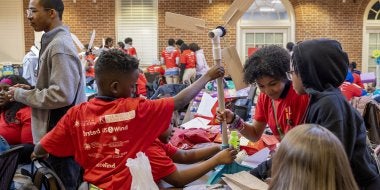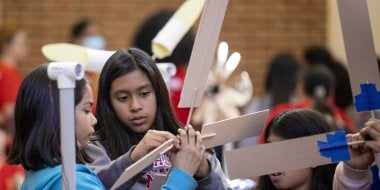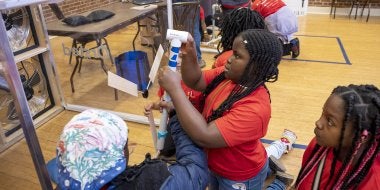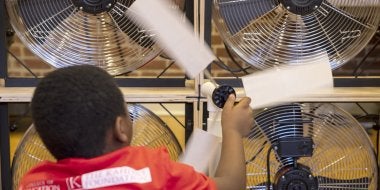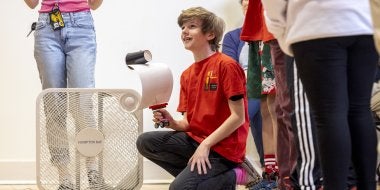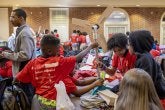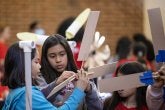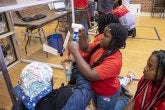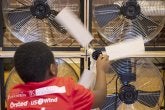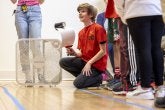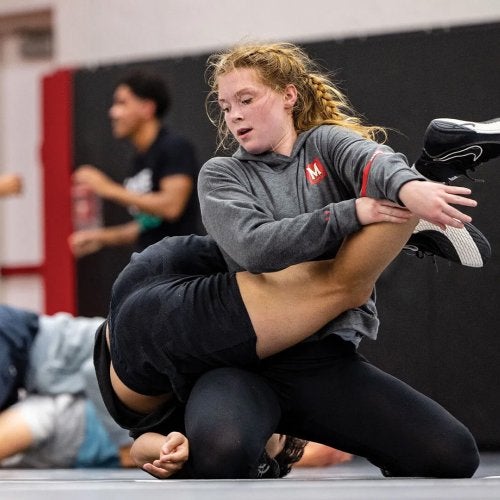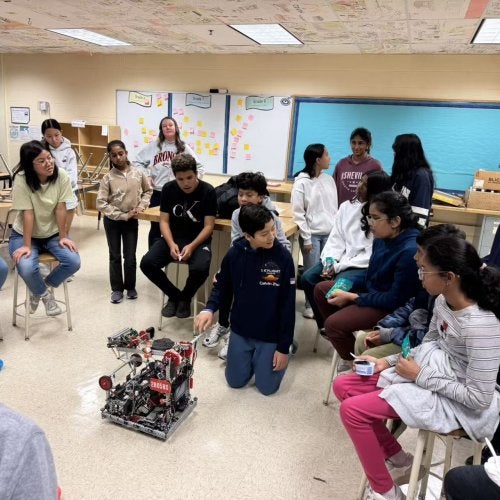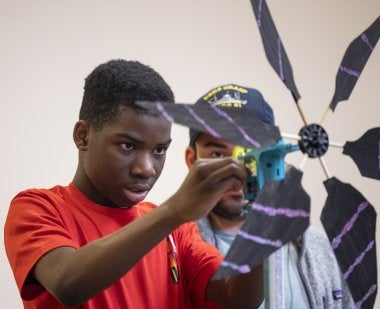
Three middle school students stood beside a wind tunnel at the University of Maryland, waiting to test their creation. After many hours spent debating, designing, testing and tweaking different iterations, the Turbinators team from Samuel Ogle Middle School (SOMS) in Bowie, Maryland, had built a small-scale wind turbine with tapering blades made of thick black paper and striped with purple glitter.
“Here we are. The moment of truth,” said their coach and SOMS science teacher Melissa Jones.
“We got this,” said student Michelle Brown. “Nervousness is for unprepared people.”
After placing their turbine in the wind tunnel and recording its energy output–“it went amazing,” said student Deekay Oludayo–the team returned to its table to adjust the angle of the blades and prepare for another trial in the wind tunnel.
The Turbinators were one of 34 student teams that traveled to the university on March 30 to participate in the first KidWind Challenge competition ever held in the state of Maryland. Spearheaded by Angela Stoltz, assistant clinical professor in the University of Maryland College of Education, the event welcomed more than 120 students in grades 4 to 12 from all over the state of Maryland and even one team from Pennsylvania. At the end of the day, the Turbinators walked away with a third-place trophy in the middle school division. Since the first official KidWind Challenge event was held in New York state in 2009, about 40,000 students have participated in 300 events in 30 states.
Clad in red Maryland KidWind T-shirts, the teams took turns testing their wind turbines in one of three wind tunnels and presenting their models and processes to a panel of judges. The students used a variety of materials to build their turbines–including balsa wood, poster board, paper cups, file folders and PVC pipe–and held them together with everything from duct tape to hot glue. One turbine was 3D printed, and one team built its own generator.
“This event today reminds me how important education and more importantly everybody in this room--teachers, students, school leaders and families--are in tackling grand global challenges” like conserving the planet and natural resources, said Kimberly Griffin, dean of the College of Education, as she greeted the group at the beginning of the competition. “There are so many brilliant minds in this room that will change our world.”
As part of the day’s events, the students also participated in an hands-on instant design challenge. The teams had 30 minutes to build and race sail cars using an assortment of objects presented to them in a paper bag–including LEGO bricks, wheels, plastic packaging, paper cups, wooden dowels, construction paper and pipe cleaners. They also took a guided tour of the A. James Clark School of Engineering with University of Maryland engineering student ambassadors.
The top two scoring teams in the middle and high school categories, plus the top scoring elementary school team, were invited to compete in the National KidWind Challenge, which will be held in Boulder, Colorado, from May 14 to 17 and will coincide with the U.S. Department of Energy’s Collegiate Wind Competition.
Participating in an activity like the KidWind Challenge can empower youth and even improve their well-being as they face anxiety about climate change, Stoltz said. “Young people are aware of the climate crisis, and it has accelerated mental health issues,” she said. She pointed to a 2021 global survey published in The Lancet in which 6 in 10 respondents between the ages of 16 and 25 reported feeling “very” or “extremely” worried about climate change. Yet she also emphasized that other research has shown that when young people have the opportunity to participate in finding solutions to climate change, their mental health outcomes improve. “Students need to feel like they are part of a community of problem solvers that are working on critical issues like climate change,” Stoltz said. “Educating our youth about sustainable development is an integral part of preparing our next generations for the future they’ve inherited.”
“Students are bombarded with calls to ‘save the planet’ but are rarely given the chance to actually create something that is helping to reduce our reliance on fossil fuels,” added Jones, who coached the Turbinators team along with Jasmine Maher, her student intern who is a Master’s Certification Program (MCERT) student in Middle School Science Education in the College of Education. “This event allowed them to be part of this conversation in a real way.”
In addition, hands-on learning experiences like the KidWind Challenge are an engaging, effective way for students to learn problem-solving skills and the engineering design process. “When a student can hold something in their hands, it’s always better than just talking about it,” said David Brelsford, an engineering teacher at Mergenthaler Vocational Technical High School in Baltimore, whose team, Tempest, placed second overall in the high school division. “Turbines allow for fast prototyping and fast results. You can design a blade and then test it immediately. It’s that quick feedback that allows for greater understanding.”
Coaches like Brelsford, as well as KidWind organizers, hope the experience will expose students to career paths in renewable energy that they may not have considered. “These fields are some of the fastest growing industries in the United States. We want to make sure kids know about them,” said Michael Arquin, founder and director of KidWind. Arquin supported Stoltz throughout the process of bringing the KidWind Challenge to Maryland and also attended the event, helping to operate one of the wind tunnels. “We’re also pulling in kids who may not have exposure in these spaces. As we build a whole new industry, let’s not lock out women or students of color. KidWind has a big focus on trying to make sure those communities are present.”
As a teacher educator, Stoltz stressed the importance of training teachers in the engineering design process and sustainable technologies–elements that are highly relevant to today’s workforce needs and possible solutions to the climate crisis but are usually missing in teacher preparation programs. In October of last year, Stoltz hosted a free training for educators interested in bringing teams of students to the KidWind Challenge, with support from Bryan Quinn, director of technical operations in the university’s Department of Electrical and Computer Engineering, and Diane Painter, a College of Education alum and a visiting associate professor of education studies at Shenandoah University, who first raised the idea of bringing the KidWind Challenge to the University of Maryland. In addition, Stoltz and Amy Green, director of the College of Education’s Center for Science & Technology in Education, will be incorporating KidWind curricula into their teacher preparation classes. This will give both current and future teachers the chance to play with wind turbine design, develop related lesson plans and build confidence in bringing sustainable development topics into their classrooms.
After the trophies were handed out and the students began to pack up their turbines for the ride home, Jennifer King Rice, senior vice president and provost, told the teams, “As I see your work and I see your faces, I also see the future scientists and engineers and educators and policymakers that we need in this world in order to address climate change through sustainable clean energy solutions.”
Stoltz added, “I loved seeing you smile. I loved seeing you play. I really hope to see you back here on campus as students or next year for our next KidWind Challenge.”
The first Maryland Regional KidWind Challenge was sponsored by The Kahlert Foundation, Ørsted, US Wind and a College of Education Dean’s Initiative Grant.
2023 Maryland Regional KidWind Challenge Winners
Elementary School:
- First place overall: Port Towns Elementary School Five Stars
Coach: Caitlin Costello
Students: Elizabeth Deba, Adrianna McKinley, Jaylah Saucedo Marquez - Second place overall: Port Towns Elementary School Girl Savers
Coach: Caitlin Costello
Students: Sophia Mejia Reyes, Andrea Sandoval, Blanca Zepeda - Third place overall: Woodbridge Elementary School Woody’s Windmill
Coach: Emma Jones
Students: Azeen Iqbal, Mahdi Iqbal, Heshmita Maddela, Ali Shariff
Middle School:
- First place overall: Martin Luther King Jr. Middle School Wind Warriors
Coach: Elaine Ramos
Students: Grace Gardaya, Jason Kresge, Anvi Moola, Zane Woodard - Second place overall: Martin Luther King Jr. Middle School Last Airbenders
Coach: Cheyenne Holloman
Students: Arielle Downs, Katherine Guttierrez, Jessica Lopez-Sanchez, Aashi Moola - Third place overall: Samuel Ogle Middle School The Turbinators
Coaches: Melissa Jones and Jasmine Maher
Students: Michelle Brown, Adrian Cousar, Deekay Oludayo, George Tresch
High School:
- First place overall: Mergenthaler Vocational Technical High School MERVO 24.1
Coach: Shawn Kerr
Students: Rayvon King, Pablo Rosales Osorio, Andre Simons - Second place overall: Mergenthaler Vocational Technical High School Tempest
Coach: David Brelsford
Students: Thomas Andrew, Parrish Cortez, Rachaud Williams - Third place overall: Mergenthaler Vocational Technical High School Five Stars
Coach: Samantha Cordisco
Sportsmanship Awards:
- Woodbridge Elementary School Woody’s Windmill
Coach: Emma Jones
Students: Azeen Iqbal, Mahdi Iqbal, Heshmita Maddela, Ali Shariff - Sudlersville Middle School Team 3
Coaches: Beth Brownley and John Shaw
Students: Wilson Blandon Lopez, Johanna Morales Dallas, Jackson Stanton - Mergenthaler Vocational Technical High School MERVO 24.1
Coach: Shawn Kerr
Students: Rayvon King, Pablo Rosales Osorio, Andre Simons
People’s Choice Award:
- AIM Academy
Coach: Alicia DeVane
Students: Aubrey Carapellotti, Declan Head, Greg Marks, Kai Rezeli, Ben Shmelzer
